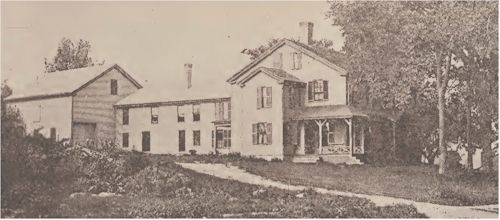Where Maine Was Made a State
Over a hundred years ago when travelers
made the stage coach journey between Bangor and Boston, their
favorite stopping place for the night was in Freeport, at the
Jameson Tavern, famous for its good cooking and comfortable
beds.
At that time Maine was a province, ruled by Massachusetts; and
it was in 1820, at the Jameson Tavern, that the final papers of
separation were signed making Maine a free and independent
State.
The old tavern still stands on the main
street of the village and in 1915, the Maine Daughters of the
American Revolution marked the house with a tablet so that the
name and historical interest of the place might be preserved.
Built in 1779 by Dr. John Hyde, the house was sold later to
Landlord Jameson who made it one of the best taverns in the
Province of Maine. It was built on a solid ledge and very large
timber was used in its construction. Long afterward it was sold
to a Mr. Codman who also kept it as a public house, but at the
time the articles of separation were signed, it was known as the
Jameson Tavern.
 |
| Jameson Tavern, Freeport, where
Act of Separation, making Maine a State was signed
in1820 |
The commissioners empowered to make
Maine a State met in 1820 in the front north-east room of the
tavern. Over a fortnight, these men who represented both Maine
and Massachusetts, deliberated and finally decided that Maine
should give to Massachusetts $180,000 for her part of the public
lands in the Province. Of this sum $30,000 was in Indian claims
which Maine assumed, and the remaining $150,000 was to be paid
in forty years with interest at five per cent. In the group of
com-missioners which made this bargain were Timothy Bigelow of
Groton, Mass., Levi Lincoln of Worcester, Mass., Benjamin Porter
of Topsham and James Bridge of Augusta, Maine. These four chose
Silas Holman of Bolton, Mass., and Lathrop Lewis of Gorham,
Maine, to complete the board. Some time before this, the
commissioners from Maine, joined by Daniel Rose of the Senate
and Nicholas Emery of the House, had gone to Boston and
discussed the matter with the Massachusetts commissioners. It
was only after a long session, during which the board met in. a
number of Massachusetts towns and cities that they came to
Jameson Tavern and signed the final papers.
Some people opposed statehood for Maine
and feeling was intense, both for and against it. At meetings
called in all the cities and villages on Mon-day, July 26, all
citizens went to the polls and a majority voted for her
independence. After this meeting, the commissioners met at
Jameson Tavern and signed the final articles of separation.
Since the tavern has become a private
residence, many changes have been made. The low-posted bar-room
is now the kitchen, but in the old time it was the chief room of
entertainment for the guests. In this room, round the blaze in
the big open fire-place, the famous judges and lawyers of
Eastern Maine, tarrying on their way home from court, told
strange tales of the road and whispered the latest political
secrets of the day.
In the north-east room the old
wainscoting still remains, but the deep window seat has been
taken out. In spite of changes there still clings to the old
house much of the charm of those far-away times when Jameson's
Tavern was the favorite hostelry of the whole countryside; and
loyal citizens should not forget that in this house in Freeport
the commissioners at that long ago meeting signed the papers
that made Maine a State.
Clara Newhall Fogg
|
![]()
![]()